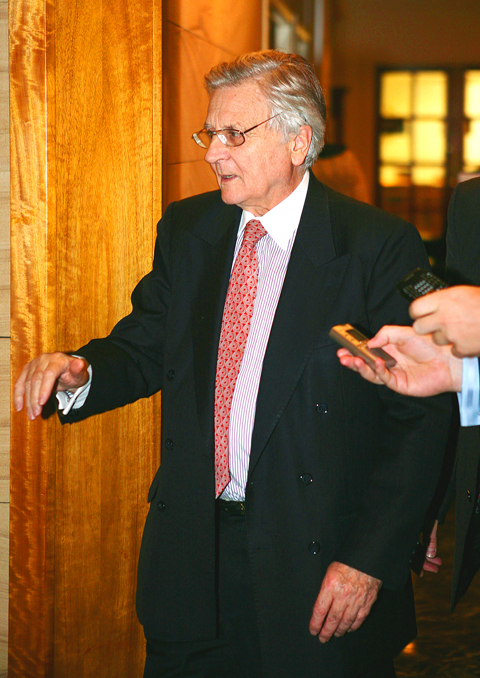European Central Bank (ECB) President Jean-Claude Trichet will cut short a trip to Australia to attend a special EU summit as concerns heighten over a debt crisis in the bloc.
EU leaders are due to meet tomorrow in Brussels for a special summit on the economy under pressure to restore confidence among investors worried that rising debt in Greece, Portugal and other weaker states in the euro zone could undermine the global recovery.
The summit was called in early January and Trichet had been expected to spend both today and tomorrow in Australia at central bank meetings. Instead, he is leaving early, officials at the Reserve Bank of Australia and the ECB said.

PHOTO: BLOOMBERG
“There is a possibility that the EU could get the ECB involved and support Greece,” said Ayako Sera, market strategist at Sumitomo Trust Bank. “Fiscal concerns that have also spread to Spain and Portugal could temporarily ease if we get something on Greece.”
The euro inched up on news of Trichet’s changed travel plans, although it remains marred near a nine-month low of US$1.3583 hit on Friday.
It has fallen more than 6 percent since mid-December when ratings agencies first downgraded Greece.
Investors have shifted funds out of riskier assets into so-called safe havens, including the Japanese yen and the Swiss franc. Yields on Greek, Portuguese and Spanish debt and the cost of insuring against default have risen sharply.
The EU usually holds four summits a year, when all 27 heads of state or government gather in Brussels. The first summit, scheduled for March, normally focuses on economic issues.
But EU President Herman Van Rompuy, who can convene a special summit at any time if there are pressing issues, called for the meeting saying the bloc needed more economic growth in order to finance its social model on a sound basis.
Eurozone finance ministers, facing the bloc’s first debt crisis in the 11-year-old currency union, tried to calm investor fears over the risk of sovereign default in peripheral states at a G7 meeting in Canada over the weekend.
They said they would ensure Greece kept to a plan to cut its budget deficit to below 3 percent by 2012 from 12.7 percent last year, the euro zone’s biggest gap.
Trichet, who attended the G7 meeting, expressed confidence in the Greek plan. But the G7 comments did little to lift investor appetite for risk.
The Dow Jones industrial average closed on Monday below 10,000 points for the first time since November, weighed down by the euro debt woes.
The MSCI index of Asian shares outside Japan slid to a five-month low yesterday.
“Sentiment is still weak amid deepening concerns about southern European nations’ sovereign rating risks,” said Juhn Jong-kyu, a market analyst at Samsung Securities in Seoul.

The CIA has a message for Chinese government officials worried about their place in Chinese President Xi Jinping’s (習近平) government: Come work with us. The agency released two Mandarin-language videos on social media on Thursday inviting disgruntled officials to contact the CIA. The recruitment videos posted on YouTube and X racked up more than 5 million views combined in their first day. The outreach comes as CIA Director John Ratcliffe has vowed to boost the agency’s use of intelligence from human sources and its focus on China, which has recently targeted US officials with its own espionage operations. The videos are “aimed at

STEADFAST FRIEND: The bills encourage increased Taiwan-US engagement and address China’s distortion of UN Resolution 2758 to isolate Taiwan internationally The Presidential Office yesterday thanked the US House of Representatives for unanimously passing two Taiwan-related bills highlighting its solid support for Taiwan’s democracy and global participation, and for deepening bilateral relations. One of the bills, the Taiwan Assurance Implementation Act, requires the US Department of State to periodically review its guidelines for engagement with Taiwan, and report to the US Congress on the guidelines and plans to lift self-imposed limitations on US-Taiwan engagement. The other bill is the Taiwan International Solidarity Act, which clarifies that UN Resolution 2758 does not address the issue of the representation of Taiwan or its people in

US Indo-Pacific Commander Admiral Samuel Paparo on Friday expressed concern over the rate at which China is diversifying its military exercises, the Financial Times (FT) reported on Saturday. “The rates of change on the depth and breadth of their exercises is the one non-linear effect that I’ve seen in the last year that wakes me up at night or keeps me up at night,” Paparo was quoted by FT as saying while attending the annual Sedona Forum at the McCain Institute in Arizona. Paparo also expressed concern over the speed with which China was expanding its military. While the US

SHIFT: Taiwan’s better-than-expected first-quarter GDP and signs of weakness in the US have driven global capital back to emerging markets, the central bank head said The central bank yesterday blamed market speculation for the steep rise in the local currency, and urged exporters and financial institutions to stay calm and stop panic sell-offs to avoid hurting their own profitability. The nation’s top monetary policymaker said that it would step in, if necessary, to maintain order and stability in the foreign exchange market. The remarks came as the NT dollar yesterday closed up NT$0.919 to NT$30.145 against the US dollar in Taipei trading, after rising as high as NT$29.59 in intraday trading. The local currency has surged 5.85 percent against the greenback over the past two sessions, central